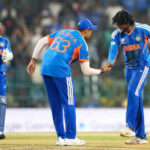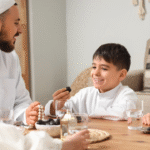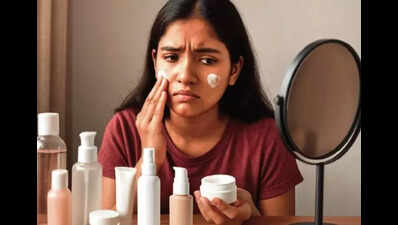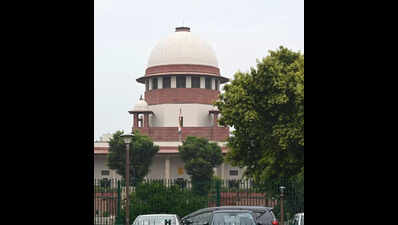Girls as young as 10 are obsessing over a perfect poreless look, applying serums and lotions that they don’t need. Dermatologists say this is triggering early onset of skin diseaseTwelve-year-old Anvita knows essences and sheet masks better than the multiplication tables her mother wishes she would revise. Every night, the tween from Gurgaon follows a 10step Korean skincare routine she picked up from Instagram reels. This includes cleansing oils, foaming washes, toners, serums, moisturisers and sleeping packs. She scrolls through posts by her favourite influencers for tips on how to grow thick brows, keep her lips soft and tinted, and achieve the flawless ‘glass skin’ glow. Conversations with friends go on for hours about which products “really work” and which brands are worth the splurge.

On Instagram, YouTube, and now even physical stores, tweens and teens are chasing the Korean skincare playbook – the dewy, poreless look once reserved for K-pop idols. But with this fascination comes a debate: what happens when children who have barely reached puberty layer on acids, retinols and actives designed for adult skin? The allure of K-beauty in India is undeniable. Fuelled by the immense popularity of K-pop and K-dramas, Indians have been drawn to the aesthetic promoted by Korean culture for years and ‘glass skin’ is among packages that every other parlour offers to women who want to look younger and flawless.But increasingly – and much to the concern of skin specialists – the pursuit of the perfect K-look has more recently engulfed tweens and teens, sometimes as young as 10-year-olds. The fad is accelerated by social media, where influencers showcase elaborate routines and seemingly miraculous transformations, making the pursuit of glass skin an aspirational goal.“My daughter, who is 13, spends more time on her skincare routine than on her homework,” said Vidisha Sharma, a worried mother from Saket, Delhi. “She insists on buying every new serum her favourite K-pop idol uses. I try to tell her that her skin is still young and doesn’t need all these chemicals, but she just rolls her eyes.”Parents are in a spotWhile Sharma tries and pushes back – at the risk of having an angry teenager on her hands – some parents offer skincare products as an incentive. “If my daughter, Rohana (13), finishes her chores and studies, I let her pick out a new Korean sheet mask,” said Rupali Patra, a resident of Sector 30 in Gurgaon. “It’s a small reward, and it makes her happy. I just make sure she’s not using anything too strong.”

But it’s a difficult position for a parent. “At first, I thought my 12-year-old daughter watching skincare videos and trying products was just a phase. But when her nightly routine turned into a 10-step regimen, I got worried. Some of these products feel too strong for her age,” said Komal Yadav, a resident of Sector 95 in Gurgaon. “I appreciate that she wants to take care of her skin early, especially with pollution and sun exposure. But I worry that she’s being influenced too much by social media and unrealistic beauty standards. Sometimes, it feels like she is chasing perfection rather than health.”A schoolyard status symbolSome parents joke about their kids’ skincare routines being longer than theirs. “I have learned to embrace it as a form of self-expression for my 11-year-old daughter, but I also stay vigilant that it’s not crossing into harmful territory. The pressure to look perfect starts so young now. It’s challenging to balance supporting my child’s interests and protecting her from harmful messages. She has a 30-minute routine at night and then a 20-minute skin care routine in the morning,” said Jai Prakash, a resident of Sector 85.“My daughter spends hours watching Korean skincare videos. At 15, she is already worrying about flawless, poreless skin. She says ‘Amma, I need a glass skin look for Instagram!’ Social media is fuelling this craze,” said S Chandra, whose daughter is in Class IX. “Every time we visit a mall, my daughter drags me to K-beauty counters. I am very concerned and now planning to visit a dermatologist, who can explain to her that these products are not good for skin at this age,” said Payal Singh, a resident of Noida.Not OK, say dermatologistsDoctors are increasingly seeing young patients with skin problems directly linked to the use of inappropriate skincare products. Dr Ruben Bhasin Passi, consultant dermatologist at Gurgaon’s CK Birla Hospital, said the natural inclination for young skin is to be healthy and resilient. “We are witnessing a disturbing trend where children as young as 10 are using products containing retinols, strong acids and other active ingredients designed for mature skin. A child’s skin barrier is still developing and is far more delicate than an adult’s. These harsh chemicals can cause severe irritation, rashes, dryness and even long-term sensitisation to certain ingredients. I have seen cases of contact dermatitis and exacerbated acne due to this,” Dr Passi said.The genetics of Korean skin, the dermatologist added, are very different. “They have more sweat glands, more open pores; their skin needs and tolerates more hydration. Indians generally have oily skin in their early teens, this later shifts to normal or dry. Overloading already oily skin with heavy hydrating products can trigger problems.“For kids aged 10–15, hormones are kicking in, sebaceous glands are more active, and the skin is naturally oilier. Add toners, serums and hyaluronic acid, and you’re essentially trapping that oil under the products. That creates a perfect environment for acne, dermatitis or other inflammatory skin conditions. If a teenager has dry or combination skin, they might tolerate some of these products, but oilyskinned teens are very likely to experience breakouts,” Dr Passi said.Dr Chandni Jain Gupta, a dermatologist and cosmetic surgeon in Noida, said, “I’ve had a mother come in with her daughter, fresh out of Class X, asking for hyaluronic acid fillers for plumper lips and flawless glass skin. Despite telling her that her daughter was too young, she insisted that it was a gift for doing well in her board exams. Another teen sought full-body hair reduction at 16 because she felt ashamed to wear dresses. This culture of comparison is damaging.”“It’s important to understand that glass skin is not just a skincare phenomenon, it’s also about genetics. The flawless skin we see online sets an unrealistic benchmark, and, unfortunately, many teenagers are now chasing influencer routines without any medical guidance. Most of these Korean skincare products have anti-ageing properties. Though there’s no ‘right’ age to start skincare, children should absolutely not be using anti-ageing products or thinking about fillers,” Dr Gupta added.Warning against blindly following influencers, Dr Passi recounted how a teenager used a medicated cream, prescribed only in specific cases, all over her face. “Instead of waking up glowing and acne-free, her face turned red and inflamed, and she rushed in thinking her skin was burned,” she said.Brands eye younger buyersThis trend of early skincare adoption is partly influenced by Korean culture itself, where skincare is often introduced at a young age. While many popular K-beauty brands mainly cater to adult skin concerns, some have recognised the growing market of younger consumers and come up with more mild formulations. Brands like SKIN1004, with its Hyalu-Cica line, focus on hydration for teens and tweens. Pyunkang Yul offers a kids and baby face lotion, and Haruharu Wonder has a Black Rice Moisture 5.5 Soft Cleansing Gel.However, the challenge lies in distinguishing between these and the more potent formulations that dominate the K-beauty market. Social media often blurs these lines, with influencers promoting a wide range of products without clear age-related disclaimers. This leads to young consumers experimenting with strong exfoliants, retinoids and high concentrations of Vitamin C, which can be detrimental to their stilldeveloping skin.Dermatologists advocate fostering a healthy relationship with skin, emphasising protection and basic hygiene over the pursuit of an unattainable ideal. Dr Gupta said, “Every day, I see patients asking how to get ‘Korean skin’. But skin health isn’t about copying trends. A simple routine with the right face wash, moisturiser and sun protection is enough at that age.”











